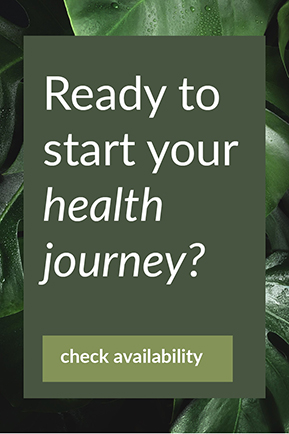Anxiety, depression, and burnout are incredibly common issues that we see in the clinic, in people of all ages and from all walks of life. Mental health issues are more common than many people may realise – nearly 1 in 2 Australians will experience a mental health disorder during their lifetime. There are a wide range of factors that contribute to mental health issues, including chronic stress, diet, lifestyle, lack of social connection, underlying health conditions, and more. This blog is designed to address the major factors associated with anxiety, depression, and burnout, and provides education and strategies to help you improve your mental health now and in the long term.
Mental Health 101 – What Does a Healthy Nervous System Look Like?
Before addressing the issues that contribute to poor mental health, it can be helpful to understand some of the physiological processes that happen in the body every day that determine our mental health and our resilience to stress.
Neurotransmitters
These are chemicals that send messages to the brain and other parts of the body and can affect our mental state, sleep, and more. The majority of these are produced in the brain itself, but they are also produced in other parts of the body too, such as the adrenal glands and even the gut. When our nervous system is healthy, our neurotransmitters are in balance – not too much of the stimulating chemicals and not too much of the relaxing chemicals. Some of the important neurotransmitters for mental health include:
Serotonin – AKA the “feel good” chemical. Interestingly, whilst many think of serotonin in terms of its production in the brain, a whopping 90% of our serotonin is actually produced in the gut by our gut bacteria!
GABA – AKA gamma aminobutyric acid. This chemical helps us to feel calm. If GABA is too low, we can experience symptoms of anxiety, such as feeling stressed, overwhelmed, and feeling unable to relax.
Noradrenaline – helps us to be focused and alert. If noradrenaline is out of balance, we can feel restless and anxious, and may have trouble with memory and concentration.
Adrenaline – also affects our concentration. Adrenaline levels rise during periods of stress and is associated with being in “fight or flight” mode. If our adrenaline levels are too high for long, we can crash, leading to fatigue and burnout.
Acetylcholine – is one of the chemicals used by brain cells to communicate with each other and is involved in memory and learning. It also plays a role in regulating our mood. If acetylcholine levels are too high, we may feel depressed.
Dopamine – is involved in feelings of motivation and reward. Low dopamine might make us feel unmotivated and down.
Cortisol – our “get up and go” hormone. Cortisol levels fluctuate over 24 hours and should be higher in the morning (typically peak at around 8am) and then gradually reduce over the course of the day until it is lowest at night. Cortisol and melatonin (below) directly affect one another. If one is high, the other one is low.
Melatonin – our sleep hormone. If cortisol levels are too high, or peak too late in the day, melatonin production can be impacted and it may be more difficult to fall asleep, as the build up in melatonin at night is partly responsible for us being able to fall asleep.
What Can Disrupt Neurotransmitter Balance?
Mental health conditions, and especially depression, are often put down to simply being a “chemical imbalance”. But what is causing this imbalance? Many different things can disrupt the delicate balance of our neurotransmitters, including:
- Hormonal imbalance due to hormones such as thyroid hormones, oestrogen, or testosterone
- Chronic stress (see below)
- Dietary insufficiencies or poor digestion – not enough of the building blocks are being absorbed for the body to make neurotransmitters. This includes protein but also many different vitamins and minerals, such as B vitamins, zinc, and magnesium
- Genetic factors, which can increase the body’s requirements of nutrients like B vitamins (a common one is MTHFR)
Other Factors that Contribute to Anxiety, Depression, and Burnout
- Overwork and overcommitment
- Lack of sleep and insufficient rest or downtime
- Psychological trauma
- Lack of social connection
- Underlying health conditions, such as thyroid autoimmunity
- Inflammation, which can disrupt normal neuronal functioning
- Toxicity and detoxification issues, including exposure to heavy metals, or poor liver clearance of toxins
- Chronic illness
- Blood sugar issues – hypoglycaemia can trigger symptoms of anxiety
- Nutrient deficiencies – deficiencies in important nutrients such as omega 3 fatty acids, vitamin D, zinc, and vitamin B12 are well documented as playing a role in mental health disorders, including depression and anxiety.
The Effects of Chronic Stress
Our bodies aren’t designed to cope with chronic stress. In times gone by, stress was an acute issue – a sabretooth tiger was chasing you and either you outran it, hid from it, or were eaten by it. In any case, the stressor was a sudden, acute situation and was completely resolved very quickly. Contrasted with today’s modern stressors, there is a huge difference in the types of stress we are encountering, and how completely we are able to resolve stress, too. Instead of spending our days hunting, foraging and seeking shelter, we are instead bombarded with high stress work demands, constant advertising, global news of war and devastation both here and in faraway countries, over which we have little control.
The issue is that our bodies cope with stress in the same way, whether that stress be a short- or long-term issue. In the early phases of the stressful situation, we move from the parasympathetic nervous system (AKA the “rest and digest” phase) into the sympathetic nervous system (AKA “fight or flight”). The digestive system, immune system and any other “non-essential” bodily functions at that time are put on the back burner and their function is reduced. The body also releases high amounts of adrenaline and cortisol, ready to cope with the issue at hand. We are ready to physically outrun or fight the threat. However, when it comes to chronic stress, this response isn’t really very helpful as there is no need to run or flight. As time goes by and we aren’t able to outrun the stressful situation, our bodies become depleted, and we begin to feel burnt out. Fatigue sets in, we are unable to concentrate, and yet we find it impossible to relax or sleep. Our immune system and digestion suffer, too, and we become more susceptible to issues such as recurrent infections or even IBS.
Gut Health and Mood
Our gut is more heavily linked to our mood than you might think. As mentioned above, 90% of serotonin is produced in the gut, but our gastrointestinal tract is also involved in regulating our mood in other ways, too. Special nerve cells in the gut form what is known as the enteric nervous system – it is also known as “the second brain”. This system, along with communication from our gut bacteria, communicates with the brain to control physical processes such as blood flow to the gut and the production of digestive secretions, but is also involved in emotional regulation. A good example of the enteric nervous system in action is the feeling of butterflies in your stomach that occurs when stressed or nervous. It can also be seen in the very real relationship between mood and symptoms in sufferers of IBS. For more information on the link between the gut and the brain, head to our website here and check out the blog post “Is your gut affecting your mood?”.

Treatment Strategies for Coping with Anxiety, Depression and Burnout
Dietary Changes
Foods to Avoid
Processed Foods
Processed foods containing trans fats and refined grains, as well as food and drinks with added sugar, cause rapid increases in blood sugar and insulin levels. This can lead to reactive hypoglycaemia (low blood sugar), triggering symptoms of anxiety. It can also negatively impact our body’s ability to maintain energy throughout the day, which can be a big issue with suffering with burnout and depression.
Examples of processed foods to avoid include:
- Refined carbohydrates – white bread, white rice, cakes, muffins, crackers, cookies, potato crisps
- Processed meats – bacon, salami, sausages, pastrami
- Foods with added or concentrated sugar – sweetened popcorn, ice cream, chocolate, fruit juices, soft drinks, cordial
- Foods containing trans fats – fried foods, pastries, hot chips
Food Intolerances/ Sensitivities
Foods that you are sensitive or intolerant to, can exacerbate fatigue and mental health symptoms, because they increase inflammation in the body, causing high cortisol levels. The digestive issues that these foods can cause will further exacerbate neurotransmitter imbalances in the long term, by impacting your body’s ability to absorb important building blocks for making neurotransmitters. Whilst sometimes it can be easy to identify food intolerances due to obvious symptoms after exposure (e.g. digestive issues after eating dairy), some intolerances and sensitivities can lead to vague or delayed symptoms. Using a food and symptom diary can help to identify trigger foods that are impacting your health and need to be eliminated.
Caffeine
The brain cleanses and replenishes itself while we sleep, so prioritising quality, restful sleep is incredibly important for looking after mental health. Caffeine can unfortunately significantly impact on our sleep. Caffeine has a long half-life of up to 12 hours, which means that 12 hours after consuming a cup of coffee, half of that caffeine is still circulating through your body and affecting you. This means that a cup of coffee at 3pm will certainly still be affecting you at 10pm when you are trying to sleep. Multiple cups of coffee (or consuming caffeine from multiple sources) further worsens the issue. If you do need to drink coffee, stick to one cup per day (preferably a good quality espresso), and make sure you have it before 10am. Be mindful of hidden sources of caffeine to ensure you aren’t mistakenly consuming too much.
Sources of caffeine include:
- Coffee and coffee-flavoured foods
- Tea (including black, green, rooibos, and flavoured tea varieties) – Note: herbal teas are generally caffeine-free, unless it is a blend that includes tea in it
- Energy drinks
- Chocolate
Alcohol
Alcohol is a no-go when it comes to managing anxiety, depression, and burnout. Alcohol worsens inflammation, reduces serotonin levels, and impacts sleep by preventing us from entering restorative REM sleep. As a depressant, it can also negatively affect our emotional state and be detrimental to improving mental health.

Foods to Include
Fresh Vegetables and Fruits
Choose a variety of vegetables and fruits in different colours and textures – this is the easiest way to ensure you are eating a wide variety of nutrients. Raw, steamed, baked, and cooked into stews and soups are great ways to prepare vegetables and fruits to maintain optimal nutritional benefits. For added fibre, keep the skin on foods such as carrots, potatoes, sweet potatoes, and apples (but be sure to give them a good scrub before preparing/ eating). Vegetables and fruits are also a great source of B vitamins, and many contain good amounts of magnesium, which are crucial for neurotransmitter production. Where possible, look for fruits and vegetables that are currently in season. Aim for 5 or more serves of vegetables and 2 serves of fruit each day. Below are some vegetables and fruits to include:
- Non-starchy vegetables: broccoli, cauliflower, green beans, eggplant, tomato, cucumber, zucchini, artichoke, asparagus, pumpkin, Brussels sprouts, onions, cabbage, kale, spinach, peas, celery, silver beet
- Starchy vegetables: potato, carrot, sweet potato
- Fruits: apples, pears, oranges, mandarins, tangerines, apricots, plums, bananas, mangoes, strawberries, blueberries, mulberries, blackberries, raspberries, cherries, watermelon, rockmelon, honeydew melon, pineapple, coconut, feijoa, grapefruit, grapes, jackfruit, lemons, kiwifruit, lychee, nectarines, papaya, passionfruit
Note: dried fruits can have very concentrated amounts of sugar in them, which cause big fluctuations in blood sugar and can worsen anxiety symptoms and feelings of burnout. Keep consumption to a minimum and combine them with a source of protein and fat (such as a few nuts) to slow down the sugar absorption.
Fresh Herbs and Spices
Use fresh herbs and spices in your cooking to add flavour to meals. They can also be added raw to salads! Herbs and spices can add extra antioxidants, vitamins, and minerals to your meals.
Some examples of herbs and spices to use include basil, coriander, rosemary, dill, parsley, oregano, garlic, ginger, mint, chives, sage, tarragon, thyme.
Protein
Protein should be a part of every single meal, as it provides the building blocks needed to make serotonin and other neurotransmitters. Having protein with every meal will also help to keep blood sugar levels balanced. Lean meats, preferably organic and pasture-raised are great additions to your diet. Beef, kangaroo, chicken, turkey, fish, and lamb are all good options, as are free-range eggs. Fish is a particularly good option as it provides omega-3 fatty acids, which are helpful for mental health. Remember not to overdo it, however – a palm-size portion is plenty, and red meats in particular should be limited to only a few times per week. Grill, bake or lightly sauté, rather than frying. For plant based proteins, this website blog has some excellent recommendations click here
Remember to also include vegetarian proteins in some meals to avoid overeating meats. These foods are rich in fibre, vitamins, and minerals as well. Some examples of vegetarian proteins include:
- Lentils
- Beans – kidney, black, cannellini, pinto, lima
- Chickpeas
- Tofu, tempeh, and edamame
- Nuts – almonds, cashews, walnuts, Brazil nuts
- Seeds – pumpkin, sunflower, sesame, chia, hemp
Whole Grains and Unprocessed Carbohydrates
Carbohydrates are an essential part of our diet, but the type of carbohydrates you consume can either help or hinder your mental wellbeing and physical health. As discussed above, “white”, processed carbohydrates aren’t good for blood sugar balance or insulin levels and can worsen anxiety and burnout issues. Instead, it is best to opt for minimally processed whole grains or other, unprocessed carbohydrate sources, such as starchy vegetables (listed above) and never let carbohydrates be the main event of your plate by always adding a quality protein and healthy fat. Options for whole grains include:
- Brown rice
- Quinoa
- Rolled or steel cut oats
- Whole grain and sourdough breads
- Buckwheat
Fats
Whilst we need to avoid trans fats (as discussed above), “good” fats are essential for healthy cells and hormones. Fatty acids are essential for neuronal cells to function properly, and omega-3 fatty acids in particular have great outcomes on mental health issues including depression.
Polyunsaturated fats, including omega 3 fats, can be found in:
- Oily fish, such as salmon, tuna, sardines, and mackerel
- Walnuts
- Hemp seeds, chia seeds, pumpkin seeds, flax seeds, and sunflower seeds and other raw nuts
Monounsaturated fats can be found in:
- Vegetables such as avocado, Brussels sprouts, olives
- Extra virgin olive oil
- Almonds, cashews, pecans, hazelnuts
- Pumpkin seeds, sesame seeds
Remember that we only need quite small amounts of fat, and a little goes a long way – a serve of almonds, for example, is about 30g, which is only 20 almonds.

Micronutrients
B Vitamins
B vitamins are needed to support neurotransmitter production and are also vital for energy, too. Vitamin B12 is a particularly important nutrient for mental health that is found only in meats and fortified foods, so vegans and vegetarians must supplement this vitamin to avoid deficiency. B vitamins are found in a wide range of foods, particularly fruits, vegetables, and whole grains. Choosing nutrient dense whole foods helps to ensure you are getting plenty of these nutrients in your diet, however supplementation may still be required.
Magnesium
Magnesium regulates the production of neurotransmitters such as serotonin, as well as being involved in over 300 processes in the body. During times of stress, magnesium is quickly depleted from the body, and many of us don’t get enough from our diet to avoid insufficiency. Dietary sources of magnesium include almonds, pumpkin seeds, sunflower seeds, and dark green leafy vegetables. Using Epsom salts in the bath can also help to increase magnesium levels, as some of the magnesium in Epsom salts can be absorbed through the skin. Supplementation may still be necessary, however, especially if you have been dealing with chronic stress in your life.
Support proper digestion and absorption
If you have been stressed and burnt out for a while, your body probably isn’t digesting and absorbing nutrients very well. One way we can help to improve digestion and absorption is by ensuring we are entering into the cephalic phase of digestion before we begin eating. This is the phase of digestion that precedes actually eating – when the look, smell, and thought of food primes our body by stimulating digestive secretions (saliva, gastric juices, and bile). We can help our bodies along by doing the following:
- Boost digestive enzyme production by drinking some lemon in warm water about 10 minutes before main meals
- Sit at the table to eat
- Put down the phone and turn off screens to eat. Avoiding distractions at the table means we are more engaged with our food, which helps us to digest and absorb more. Not scrolling on your phone also prevents us from feeling stressed while we eat, which worsens digestion and absorption.
Lifestyle Strategies
Exercise
Whilst exercising when your mental health isn’t good can feel difficult, it is so important to move your body each day. In addition to boosting your mental health, exercise is important for improving sleep quality, heart health, and for maintaining muscle and bone health. On difficult days, walking is a great choice which can seem less daunting. Start with 20 minutes per day and build up slowly to one hour per day. Walk quickly enough that you break a sweat. When you feel ready, challenge yourself with more vigorous exercise at least once or twice per week. Solo options include gym workouts or classes, bike riding, jogging, or swimming. You could also use exercise as a social outlet and try group-based exercises such as team sports or rock climbing.
Sleep
Sleep is so vital not just for physical health but also for mental health. When we are asleep our brains repair and renew themselves, dealing with inflammation and clearing away toxins and metabolic waste products. Without adequate sleep, these processes can’t be properly done, which can worsen mental health symptoms and fatigue. Below are just a few methods for helping you to prioritise quality sleep.
- Get yourself outdoors for some sun exposure each morning, sometime between 8am and 10am. This triggers your body to release cortisol (our awake and alert hormone) in the morning when it is needed and allows plenty of time for cortisol to decrease in the evening and allow melatonin levels to rise in time for sleep. Sunlight exposure is also important for vitamin D production, which is a crucial nutrient when it comes to mental health.
Note: bright fluorescent lights in the office don’t cut it! The sun is 10,000 times brighter and is needed in order to have the positive effect on cortisol regulation. - Create the right environment for melatonin production in the evenings by improving your dark exposure:
– No overhead lights – use low-light lamps only (salt lamps work well for this, or switch the bulbs in your lamps to warm, low-light types)
– Have at least 1 hour of screen-free time before bed (that means no TV, computer, laptop, tablet, or phone).
– Use blue-light blocking glasses in the evenings – these help to reduce the cortisol-rising effects of blue light and promote better melatonin release before bed.
Digital Hygiene
As discussed above, screen-based technology can have a significant impact on sleep and mental wellbeing by adding stress and anxiety to our lives. There’s even a term for it – doom scrolling. Limit your screen use as much as possible by utilising timers and parent-lock apps to keep you off your phone if required. It can also be worthwhile setting yourself a schedule of when to engage in news reading and social media to limit your consumption of these, particularly if they can be a source of stress for you.
Social Connection and Support Networks
Social connection and support networks are vital for lasting mental wellbeing. We are social creatures and need to have that connection in our lives. Friends and family that have a positive influence in your life and make you feel good about yourself are a great source of connection. We can also seek community in other places, such as hobby groups, social sports, and local religious community groups. Volunteer groups such as SES and Landcare (among others) are also a great place to find meaningful social connection, while also offering an opportunity to give back to the community.
Find a Counsellor or Therapist You can Connect With
If you don’t already have a regular counsellor or Psychologist, it is worthwhile pursuing this. Having someone you can speak to about stressors in your life can make a huge impact on you mental wellbeing. A qualified counsellor or psychologist can help with facilitating lasting lifestyle changes, identifying patterns of behaviour that need to be released, and finding underlying issues and roadblocks that may be limiting your healing journey. Performance in Health Wellbeing clinic not only has myself as Naturopath to support clients on strategies of diet, lifestyle and nutrient deficiencies – we also have a team of highly qualified mental health specialists to make sure that your whole person is supported.
Practice Mindfulness
Mindfulness meditation and meditative movement are excellent additions to your daily life when healing from mental health issues and burnout. Research shows that these practices can greatly improve mental wellbeing in both the short and long term, by bringing us out of fight or flight mode, reducing cortisol levels, and helping us to build resilience to stress. Even ten minutes of daily mindfulness meditation can help reduce feelings of stress. Meditation studios offer both in-person and online classes, or you can use an app such as “insight timer” for access to thousands of guided meditations for free. Meditative movement practices such as yoga, tai chi, or Qi gong are also helpful. As with meditation, there are many studios out there that offer regular classes. There are also many apps available online, or you can try YouTube for free videos – “Yoga with Adrienne” is a popular YouTube channel with dozens of free videos to use.

Prioritise rest
Especially when recovering from burnout, prioritising rest and downtime is vital. It can be helpful to remember that we do not need to be productive during every waking hour! Taking time out to rest and be calm outside of sleeping hours is an important part of living a balanced life and supporting your mental health. Set aside one hour for down time each evening – the hour before you go to sleep is an ideal time. Use this hour to practice self-care (a bath or shower is a great idea), or to otherwise nourish yourself. This might mean reading a book, listening to some music (or playing an instrument), engaging in a hobby, practicing yoga, or simply spending quality, screen-free time with a loved one. Taking time out for yourself each day can help to improve your feelings about the day and helps you to move out of fight or flight mode.
Herbal Medicines for Mental Health
There are many wonderful herbs that are fantastic for supporting mental health and for recovering from burnout. Here are just some of the herbs that can be used:
- St John’s Wort, which has anti-depressant properties and works to increase serotonin levels
- Saffron, which increases serotonin as well as GABA
- Chamomile, well-known for its calming properties, can help with anxiety and improve sleep, too
- Passionflower, which can reduce anxiety and increases GABA
- Ashwaghandha, which is known as an adaptogen – helps to increase our resilience to stress
- Liquorice, which can help to balance cortisol levels
- Kava, which increases GABA and helps with anxiety
- Nettle, which promotes calm and is also a highly nutritive herb with lots of magnesium and other micronutrients for neurotransmitter production
- Oats seed, which helps to nourish the nervous system overall to help with healing
You may also be on anti-depressant medication and it is important that a fully trained herbalist/naturopath investigates which herbs and supplements work well alongside these medications as some can be contraindicated.
Sample Daily Eating Plan – No Dietary Exclusions
Breakfast: 2 free-range eggs, scrambled, with lightly wilted spinach, grilled tomato and sautéed mushrooms
Snack: 20 grams of organic walnuts with 1 cup blueberries
Lunch: Palm-sized serve of chicken breast with quinoa and salad (tomatoes, lettuce, cucumber, red cabbage) and a a drizzle of extra-virgin olive oil
Snack: carrot sticks with ¼ cup of tahini or hummus
Dinner: Grilled salmon fillet with a small serve of brown rice and steamed broccoli, asparagus and green beans, topped with freshly chopped parsley or dill.
Sample Daily Eating Plan – Vegan
Breakfast: 1/3 cup scrambled tofu cooked in freshly grated turmeric, with a grilled tomato and one cup wilted spinach on the side
Snack: ½ cup homemade chia pudding with 1 cup strawberries
Lunch: Grilled eggplant and chickpea salad with cherry tomatoes, red onion, capsicum, and fresh chopped parsley, with ¼ cup hummus
Snack: An apple and 30g walnuts
Dinner: vegan burrito bowl – kidney beans cooked in cumin and paprika, with mixed leaf lettuce, capsicum, tomato, cucumber, and corn, ½ an avocado, freshly chopped coriander and chilli










